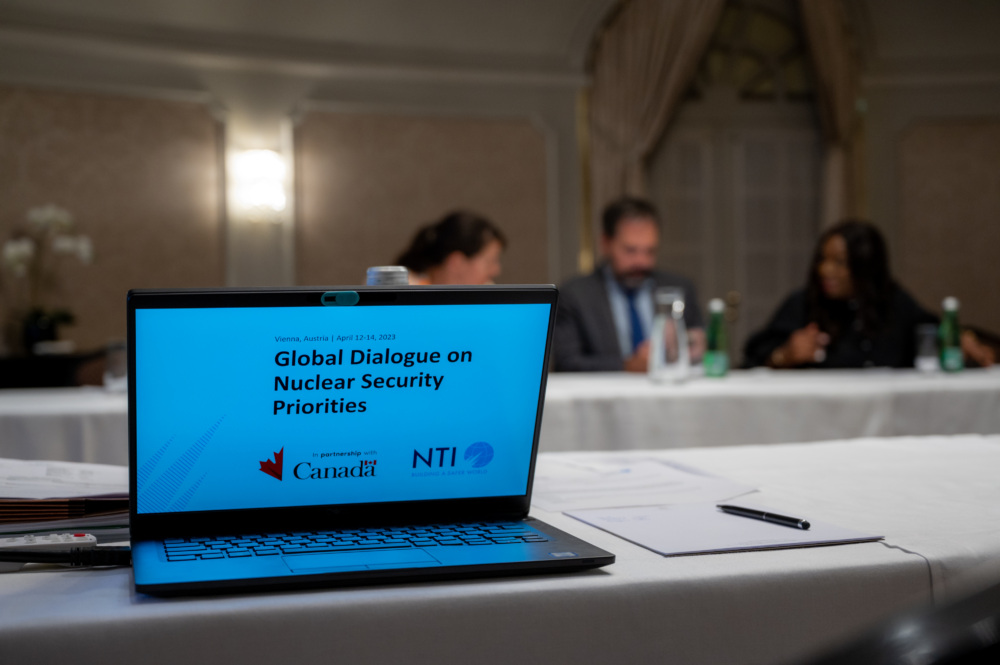
Sam Nunn
Co-Founder and Co-Chair, NTI
SHERY AHN, BLOOMBERG ANCHOR: We now welcome former Senator Sam Nunn, co-chair of the Nuclear Threat Initiative, who as a Senator in 1991, co-authored the Nunn–Lugar Act, which provided the plans for dismantling the nuclear arsenals of former Soviet countries. Sir, thank you so much for your time today. There were low expectations for this summit, but there were some hopes that this could reset the conversation with Russia that it could in fact revitalize those efforts to limit the spread of nuclear arsenals. How much of that has been achieved?
SENATOR NUNN: Well, I have commented on several summits between the United States and the Soviet Union, and the U.S. and Russia, and this may be the most difficult, Shery, to put in perspective. I would say that there are several different ways to look at it. There is a good category, although that hasn't attracted much attention. There is a bad category, there is an ugly category and there are a number of unknowns. So it's going to take some time to sort it out.
On the good side, the presidents did address strategic stability of nuclear weapons. That's the primary responsibility of both presidents because the United States and Russia have 90 percent of the nuclear weapons and the nuclear materials. So that's what I call an existential interest. They also discussed, on the positive side, catastrophic terrorism, and they discussed the need to cooperate on North Korea. So those are good items, but there were a lot of things that are very disturbing.
SHERY AHN: You have written in an op-ed that the U.S. has been stuck in a retaliatory spiral of confrontations that have only led to less communication and more acrimony and tension, and that there were real risks of characterizing all dialogue with Russia as suspect even when it's essential to U.S. security. Does an extraordinary relationship with Russia, which President Trump has said that he wants, serve American interests?
SENATOR NUNN: Well, we have an existential stake in each other’s leadership. We have an existential stake in warnings systems on both sides working properly. We have an existential stake, the United States and Russia, in terms of the leadership and those who control our nuclear weapons. And those people need to talk to each other. We talked to each other even during the Cold War. So for the last few years, we have not been communicating. And so if there is a positive side of this summit, and there are certainly some negatives, if there is a positive side, I think it would be perhaps creating the space for people who are controlling nuclear weapons and responsible for this area in both countries to begin to have the kind of communication, not communication as if we were friends— if we were friends, we wouldn't probably have all these problems – but communication to make sure we don't have some type of risk that leads to a terrible catastrophe. And there are lot of risks that need to be reduced.
KEVIN CIRILLI, BLOOMBERG ANCHOR: Competitors was the word that President Trump used for the relationship between the U.S. and Russia, but it is so hard to ignore the fallout from the Republicans, mostly the Republicans in addition to Democrats, about what yesterday represented in terms of U.S.-Russia relations. So my question to you, sir, would be when you look at the issue of the President standing next to Russian President Putin and questioning the validity of the U.S. intelligence community and the findings of them or making them somehow equivalent, does it make it more difficult to negotiate on these very important deals that you're talking about, given what we just witnessed?
SENATOR NUNN: Absolutely, it makes it much more difficult. It poisons the climate. It reduces the support that the President needs back home from both Republicans and Democrats. I would say that there has been damage to two of America's vital interests, one was on the way to the summit at the NATO meetings, where the President criticized longstanding allies and good friends from Germany and the U.K., as well as the European Union. That was, in my view, very damaging and just the opposite of what you need to do before you meet with the leader of Russia.
The second damage is what you just alluded to, Kevin, and that is to our intelligence community and our law enforcement. The intelligence community and law enforcement’s morale and credibility are absolutely vital to America's domestic, as well as our foreign interest. And to have the President of the United States in effect implicitly if not explicitly damage that credibility and side with President Putin on the matter of interference with the U.S. elections, in my view, was very damaging. We'll pay a price for both of those mistakes over the next year or so or maybe longer. But there still are things we must do in terms of communicating with the Russians.
KEVIN CIRILLI: I do want to get some more that we got from the White House. Deputy Attorney General Rod Rosenstein was at the White House earlier today for routine meetings. He did not meet with President Trump while he was there. We're also anticipating that the President will be making some remarks publicly ahead of his meetings this afternoon with Members of Congress. Follow up to you, sir, with regards to that image that we just saw, President Putin literally handing the ball to President Trump and saying that the ball is in his court. But the United States with all the Congressional reaction, it would appear that the ball is in Congress' court. Can Congress do anything, and if so what, to tweak or change or influence how this President negotiates with Russia?
SENATOR NUNN: Yes, Congress can do a number of things. One, they need a small committee, in my view, of House and Senate members, key committee chairmen perhaps, that would meet with the State Department on a regular basis on the whole question of Russia and Russia relations. We have all sorts of vital interests regarding Russia and yet right now we have the President of United States who has been discredited not just with Democrats, but also with Republicans. So that's one step that needs to be taken in coordination, because we don't want the Secretary of State, the Secretary of Defense and other key administration officials to be hobbled in terms of the diplomacy they must discuss with the one nation on earth that can basically destroy the United States albeit at the expense of their own destruction.
So that's an important step they can take. And I think it's important for Republicans to move much further down the line of what I call “creeping candor.” They need to be speaking out. A few courageous Republicans are speaking out, but many of them are not. And it's not just on this summit it's also on other very key issues relating to trade and other things that are very important.
Congress is an independent branch of government. The Senate and the House are independent under the Constitution, and they need to begin to stand up and show that they are independent. They need to stand up and show also they put our national interest in front of their party interest, both sides.
SPEAKER: Right. Yes, right. Sam Nunn, co-chair of the Nuclear Threat Initiative, here speaking with us. Thank you so much.
Sign up for our newsletter to get the latest on nuclear and biological threats.
The co-conveners and participants of the Euro-Atlantic Security Leadership Group call for the re-establishment of basic principles relating to security and nuclear order.
To make good on their COP28 pledge, countries need a new approach to building, regulating, and financing nuclear technology.
Lessons Learned from 10 Years of the Global Dialogue on Nuclear Security Priorities


